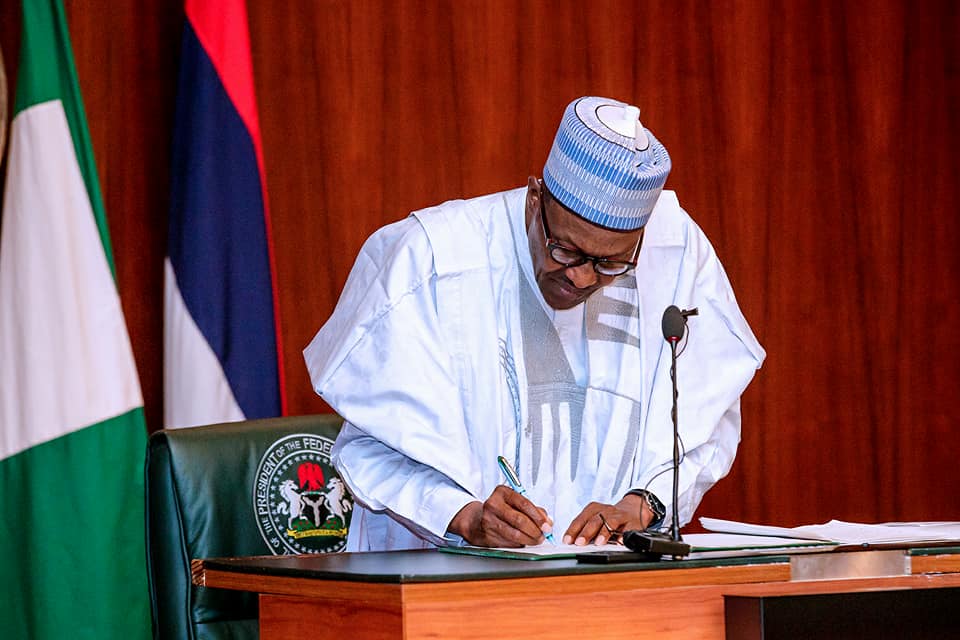May 29: Tribunal Declines To Stop Buhari’s Inauguration
The Presidential Election Petition Tribunal sitting in Abuja has declined to issue an interim injunction to stop the Acting Chief Justice of Nigeria, CJN, Justice Tanko Muhammad, from swearing-in President Muhammadu Buhari on May 29, pending the determination of issues surrounding his re-election.
A four-man panel of Justices of the tribunal which is conducting its proceedings at the Court of Appeal Headquarters in Abuja, dismissed the motion which was filed by the Hope Democratic Party, HDP.
The tribunal, in a ruling that was delivered by Justice Joseph Ikyegh, held that the motion that sought to abort President Buhari’s inauguration lacked merit.
The panel took the position late Wednesday, shortly after the President of the Court of Appeal, Justice Zainab Bulkachuwa, announced her decision to recuse herself from further presiding over petitions against President Buhari.
HDP and its candidate, Chief Ambrose Owuru, are among petitioners challenging the declaration of President Buhari as winner of the February 23 presidential election.
In their petition marked CA/ PEPC/001/2019, the party, urged the tribunal to nullify the outcome of the election and order a fresh poll. Owuru who secured a total of 1,663 in the presidential election, insisted that the election was not conducted in compliance with the Electoral Act.
Though the tribunal had yet to commence full-blown hearing on the petition, the party, filed an ex-parte motion for a court order to stop President Buhari from being sworn-in for a second term on May 29. Specifically, the party and its candidate, in the motion, asked the tribunal to stop the Acting CJN from administering any oath on President Buhari at the expiration of his current term, pending the determination of the petition.
The petitioners further applied for an order of the tribunal to restrain President Buhari from presenting himself to be sworn-in, until “the question as to whether he has been validly elected”, is determined. The motion was predicated on section 1(2), 6(6), 139, 239 of the 1999 Constitution, as amended, as well as on sections 26(4) (5), 138(1) (b) of the Electoral Act, 2010, as amended.
Cited as 1st to 3rd Respondents in the matter were President Buhari, the Independent National Electoral Commission, INEC, and the All Progressives Congress, APC.
The two principal prayers in the motion on notice dated May 9, read: “An order of this honourable court restraining the 1st respondent herein from presenting himself on May 29, 2019 or any other date for swearing in or inauguration ceremony or taking the oath of allegiance or office as the President of the Federal Republic of Nigeria, pending the determination of this Petition and the question as to whether he has been validly elected as challenged and pending before the court”. As well as, “An order of this honourable court restraining the Chief Justice of Nigeria or any other Justice in that stead from swearing in, administering the oath of allegiance and oath of office or participating in the inauguration ceremony on May 29, 209 or any other date to swear in the 1st respondent, s the President of the Federal Republic of Nigeria pending the determination of this petition contesting the validity of the substituted and questioned presidential election of February 23, 2019.”
Enumerating grounds upon which they filed the motion, the HPD and its candidate who secured a total of 1,663 in the presidential election, contended that it would be legally inappropriate to allow President Buhari to assume office on the basis of an election that he did not validly win.
According to the petitioners, “A restraining order by this court is appropriate to preserve the subject matter of this petition and prevent the 1st Respondent from foisting a fiat accompli and state of hopelessness on the court and render the election petition before the court nurgatory.
“The law is settled that once the question of the validity of Election of any person is challenged as to whether he is validly Elected or not, the person is not competent to take office or assume the seat of power. See section 139 and 239 of the 1999 constitution, Nwobodo Vs. Onoh (1981),1 Sc p.97, and also Collins Obih V Sam Mbakwe (1984) 1SCNLR 192, 202 and 203.
“The Constitution of the Federal Republic of Nigeria prohibits and forbids that Nigeria or any part thereof be governed or taken over by any person or group of persons except in accordance with the provisions of the constitution. See section 1(2) of the 1999 constitution, as amended”.
The petitioners, through their lawyer, Mr. Oliver Eya, noted that pleadings have been concluded between parties in the petition they lodged against the presidential election fixed for pre-trial hearing session.
“In spite of the pendency and scheduled hearing of this petition over the invalidity of the questioned substituted Presidential Election and return of the 1st Respondent of February 23, 2019, for reason of non-compliance and violation of the provisions of the Electoral Act 2010, the 1st Respondent is frantically making preparation to be sworn in and inaugurated on the 29th of May 2019, inviting the Chief Justice of Nigeria and the public”, the petitioners added.
In a 21-paragraphed affidavit that was deposed to by one Anwal Abdullahi, the petitioners insisted that the February 23 presidential poll was invalid for reason of non-compliance with and violation of the Electoral Act involving the undue postponement of election from February 16 that it was previously slated for.
The petitioners alleged that INEC “self-sabotaged” itself and shifted the election, thereby, “giving way for the people’s controlled affirmative Referendum Election validating the 1st Petitioner endorsed 50 million majority votes threat”.




